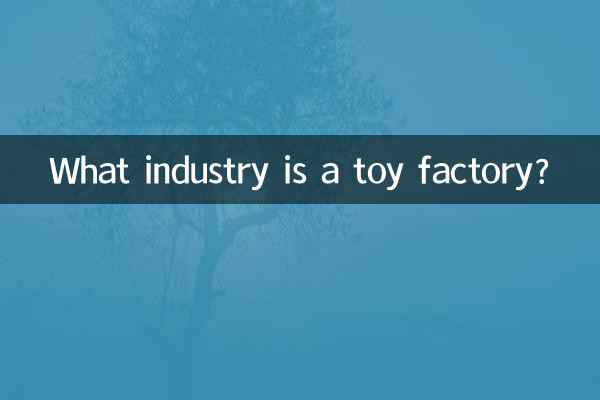What industry is a toy factory?
Toy factory is a subdivision in the manufacturing industry that mainly focuses on the design, production and sales of various toy products. This industry not only covers traditional plastic toys and plush toys, but also includes electronic toys, educational toys, and smart toys that have emerged in recent years. The products of toy factories are aimed at children, teenagers and even adult markets, and have a wide range of application scenarios and consumer groups.
In recent years, with the development of technology and changes in consumer demand, the toy industry has been constantly upgrading. The following is the data related to the toy industry in hot topics and hot content on the Internet in the past 10 days:

| hot topics | heat index | Main discussion content |
|---|---|---|
| The rise of smart toys | 85 | AI technology is integrated into toys, such as intelligent robots, programming toys, etc. |
| Eco-Friendly Toy Trends | 78 | Biodegradable materials and sustainable design have become new directions in the industry |
| The impact of blind box economy on the toy industry | 72 | Blind box gameplay drives toy sales, but also causes controversy |
| Domestic toy brands go overseas | 65 | Performance of Chinese toy manufacturers in the international market |
| Upgraded toy safety standards | 60 | Countries have increasingly stringent requirements for toy safety |
Industry chain analysis of toy industry
The industry chain of a toy factory usually includes the following links:
| link | Main content | Representative enterprise |
|---|---|---|
| Raw material supply | Plastics, fabrics, electronic components, etc. | BASF, DuPont, etc. |
| Design and R&D | Product creativity and function development | LEGO R&D Center, Hasbro Design Team |
| Manufacturing | Processing, assembly, quality inspection | Dongguan Toy Factory, Shantou Toy Industry Cluster |
| Sales and Distribution | Online and offline channel construction | Amazon, Toys R Us |
| After-sales service | Repair, return and exchange processing | Customer service centers of major brands |
Development trends in the toy industry
According to recent market data and industry analysis, the toy industry shows the following development trends:
1.Intelligent: With the development of artificial intelligence and Internet of Things technology, the market share of smart toys is increasing year by year. Such toys not only interact with children but also provide educational functions.
2.Enhanced educational attributes: The popularization of STEM education concepts has driven the sales growth of educational toys such as programming robots and scientific experiment sets.
3.IP licensed toys are popular: Toy products authorized by film, television and animation IP are more popular among consumers, such as Disney and Marvel series toys.
4.Adult toy market expands: The product line of adult-oriented toys such as decompression toys and collectible models continues to expand.
5.Cross-border e-commerce assistance: More and more toy companies are expanding overseas markets through platforms such as Amazon and AliExpress.
Toy Industry Challenges
Despite the promising prospects, toy factories also face many challenges:
| Challenge type | Specific performance | Response suggestions |
|---|---|---|
| Raw material prices rise | Increased cost of raw materials such as plastics | Find alternative materials and optimize supply chain |
| international trade friction | Tariff barriers increase | Diversified market layout |
| Serious product homogeneity | Lack of innovation leads to fierce competition | Increase R&D investment and focus on IP construction |
| Safety supervision tightens | Testing standards in various countries have improved | Establish a complete quality management system |
| Consumer preferences change rapidly | Epidemic cycle shortened | Strengthen market research and respond quickly |
Conclusion
As an important part of the manufacturing industry, toy factories are facing both opportunities for transformation and upgrading and pressure from market competition. In the context of current consumption upgrades and technological changes, toy companies need to keep up with trends and grasp the development directions of children's education, smart technology, cultural creativity, etc., in order to maintain their advantages in the fierce market competition. At the same time, focusing on product quality and safety and practicing environmental protection concepts are also the keys to the sustainable development of the industry.

check the details

check the details